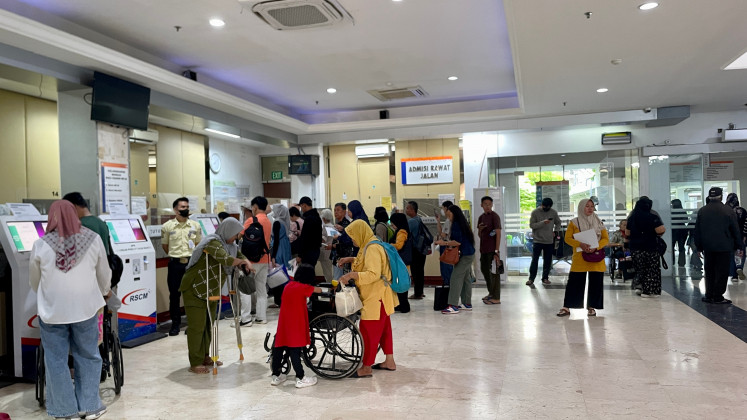Popular Reads
Top Results
Can't find what you're looking for?
View all search resultsPopular Reads
Top Results
Can't find what you're looking for?
View all search resultsAjip Rosidi: A great man of culture
At just 15, Ajip Rosidi's short stories and poems had already been published in prominent magazines, allowing him to make the money he needed to satisfy his passion for books
Change text size
Gift Premium Articles
to Anyone
At just 15, Ajip Rosidi's short stories and poems had already been published in prominent magazines, allowing him to make the money he needed to satisfy his passion for books.
AJIP ROSIDI: (JP/Yuli Tri Suwarni)
Now 70, Ajip said magazines such as Mimbar Indonesia, Siasat and Zenith paid him between Rp 25 and Rp 125 for each piece he wrote. At the time it was a lot of money, as a kilogram of rice cost Rp 1.
Ajip began to write after reading Penuntun Karang Mengarang (A Guide to Writing) by Si Uma. But the book that inspired him most was Amal Hamzah's Pembebasan Pertama (The First Liberation).
At night, while other teenagers were sleeping, Ajip sharpened his mind and expressed his feelings through writing poems and stories.
"I learned a lot by listening to people who were much older than me and had more experience. My self-confidence to make a living as a writer became stronger," Ajip said in his autobiography, Hidup Tanpa Ijasah (Living Without a Certificate).
The autobiography was released on Jan. 31, 2008, his 70th birthday, at Padjadjaran University, Bandung.
Ajip's first collection of short stories, Tahun-tahun Kematian (Years of Death), hit the market in 1955, when he was 17. He wrote Lutung Kasarung, a legend from his hometown of West Java, three years later, and has produced numerous literary works since then.
With his great writing potential, Ajip, who was born in Jatiwangi, Majalengka, dropped out of high school to focus on his writing career.
His fresh ideas for creating stories, poems and verses as well as essays on literature and culture flowed and his ability to mingle with people from all walks of life enriched his knowledge and broadened his horizons.
In 1954 respected literary figure Sutan Takdir Alisyahbana predicted Ajip would become a great poet because of his ability to express his feelings through his work.
Researcher Ulrich Kratz said Ajip was the most productive writer in Indonesia with 326 works published in 22 magazines before 1983.
This modest man now lives in Pabelan, Magelang, Central Java, far away from the hustle and bustle of the city, "to seek clear water."
From an early age, Ajip read books in Indonesian and Sundanese, including the works of H*ctor Malot, Alexandre Dumas and H. Rider Haggard, which had been translated into Sundanese in the 1950s.
He was born into a Sundanese-speaking community.
"As I learned about cultures other than Sundanese, I became aware of the specific values in Sundanese culture ... noble and positive values which I want to maintain and develop," he said.
Ajip makes endless efforts to preserve Sundanese culture, including the language, even though he is no longer living on "Sundanese land".
Just as in other parts of the world, traditional cultures -- like Sundanese with its own unique literature and language -- often receive little attention from the local communities.
Threats to his "mother" culture are Ajip's biggest challenges, as writers of Sundanese literature work in a nonsupportive environment, i.e., one that does not appreciate local literature.
Since 1989, Ajip has set aside a portion of his earnings to present the Rancage Sundanese Literary Award every Jan. 31 -- his birthday.
The idea first came to him when he was in Japan, where he lived from 1980 to 2003. He was asked to teach Indonesian language and literature in several places, including Tenri Daigaku, Kyoto Sangyo Daigaku and the Asahi Cultural Center in Osaka.
In 1993, he founded the Rancage Foundation with the support of his family and friends who were also concerned about Sundanese culture and were encouraging local writers.
With no financial support from the government, the foundation has also awarded Javanese and Balinese literary works since 1994 and 1998 respectively.
Even though Ajip gives much attention to Sundanese culture, he does not want people to think he only cares about that culture.
He said people should think outside the box when talking about cultures. Instead of speaking singularly of rigid boundaries defining a single way of life, cultures should be seen as complementing each other in an open system, interacting harmoniously.
Ajip was recently invited to speak at a dialogue on cultural reconciliation that also featured Sri Sultan Hamengkubuwono X as a speaker at Hotel Preanger in Bandung.
Ajip said he was concerned about the commercialization of culture, which he could see happening now.
"How can you have the Ministry of Tourism and Culture? Culture is not a product for sale, it is a way of life, not something for sale," he said.
He said the government should clearly define culture when using it as a tool to promote tourism. Otherwise people will perceive culture as something merely commercial and will not see it as a philosophy of life that should be preserved by the community.
"The fact is, look at how chaotic our country is when culture is considered part of tourism," he said.
Ajip, who proposed the establishment of the Jakarta Arts Council in 1968 when Ali Sadikin was the city governor, continues to talk about the need to take concrete action to preserve culture and often attends cultural events in Jakarta and Bandung.
Early in July, Ajip visited Bandung to pass his message to one of the mayoral candidates who had come to visit a local library.
While there, Ajip asked for a "room" to accommodate the cultural works of Bandung residents. Having such a room, Ajip said, would be a real step to encourage love of culture.
















